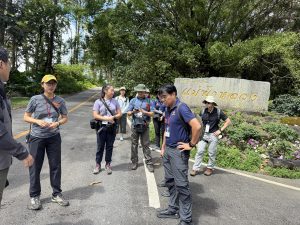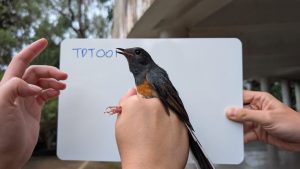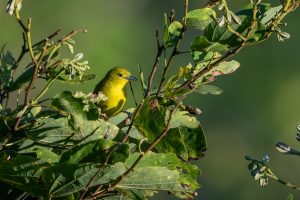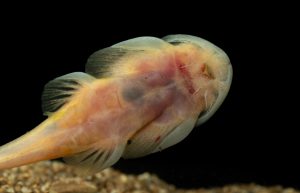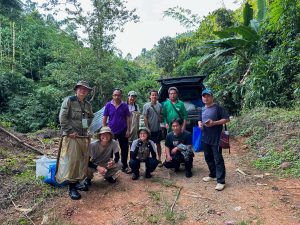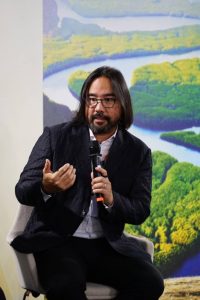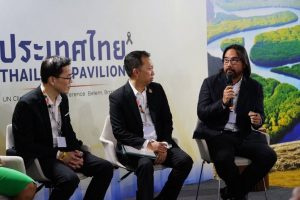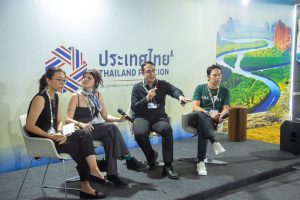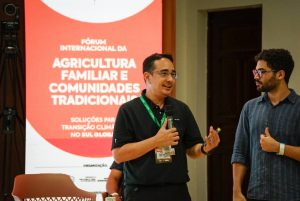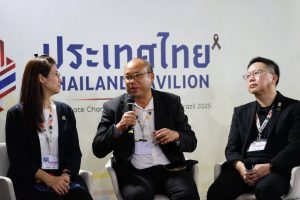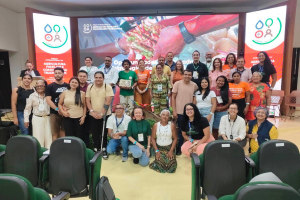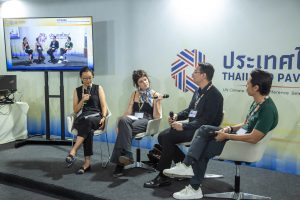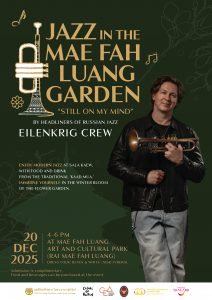Mae Fah Luang Foundation convenes “MFLF Sustainability Forum 2025”
Theme: “Global Challenges, Local Solutions at Scale” — Rallying ideas for sustainable pathways for Thailand amid global crises
The Mae Fah Luang Foundation under Royal Patronage organized the MFLF Sustainability Forum 2025 under the theme “Global Challenges, Local Solutions at Scale.” The opening ceremony was presided over by Thanphuying Putrie Viravaidya, Chairperson of the Foundation, together with members of the Board of Directors. M.L. Dispanadda Diskul, Secretary‑General and Chief Executive Officer, joined representatives from government, the private sector and communities at the Queen Sirikit National Convention Center, Bangkok, on 22 September 2025.
Designed as a platform for cross‑sector collaboration, the Forum brought together practical knowledge and experience in sustainability, highlighting both the challenges and opportunities for Thailand to overcome global environmental and economic headwinds through partnerships among the state, business and communities.
Keynote address — “A whole‑of‑society push is essential”
Dr. Phirun Saiyasitpanich, Director‑General of the Department of Climate Change and Environment, underlined that both the world and Thailand are facing multi‑layered pressures — from geopolitical tensions and trade measures to stricter international regulations. Concurrently, environmental crises such as biodiversity loss and widespread wildfires (over 42 million rai worldwide — approximately 6.7 million hectares) are weighing on Thailand’s grassroots economy. Although domestic forest loss has slowed compared with many regions, Thailand will struggle to adapt without proactive measures. Recent IPCC assessments indicate that climate finance and community linkages remain insufficient, reinforcing the need for concerted action by all sectors.
He cited the Mae Fah Luang Foundation as a case in point: conservation must be paired with sustainable use and fair benefit‑sharing. On trade, instruments such as the EU Carbon Border Adjustment Mechanism (CBAM) and the EU Deforestation Regulation (EUDR) will affect Thai exports and national income. Thailand’s carbon market remains nascent; T‑VER needs linkages to compliance mechanisms, and the draft Climate Change Bill must be advanced. The overarching goal, he said, is a resilient climate ecosystem — legislation and a climate fund that connect the voluntary and compliance carbon markets, ensure equitable benefit distribution to citizens, and keep Thailand on a firm trajectory toward net‑zero by 2050.
Remarks by M.L. Dispanadda Diskul — “From BAU to shared prosperity”
M.L. Dispanadda emphasized the pivotal role of communities and all stakeholders in driving sustainability, noting that carbon credits from community forests have surpassed the original target fourfold, reflecting years of diligent work and collaboration. Conservation and prevention, he stressed, produce lasting results only when everyone shares in the benefits.
He underscored that business‑as‑usual is no longer sufficient. Action must go deeper than conventional environmental projects to encompass overall well‑being, with nature as a core pillar. Thailand should seize opportunities arising from today’s challenges: Are we ready to invest in nature credits to advance sustainable development? At the same time, outcomes must be evidenced by real results; the community‑forest carbon credit initiative shows that success is possible when every party prioritizes and cooperates. Efforts must also look across generations — sustainability is not a 10–15‑year horizon but a commitment to future generations who may bear the consequences. Economy and sustainability are one and the same, and Thailand needs rules that deliver genuine change while preventing corporate capture of development that rightly belongs to communities. Agriculture, he added, is vital. If productivity and climate resilience improve, agriculture can generate and distribute income widely because the entire supply chain occurs within Thailand. Above all, every sector must weigh the cost of action versus the cost of inaction.
Main discussions (three sessions)
Session 1 — “Global Challenges, Thai Solutions”
Speakers: Piyachart Isarabhakdee, Co‑Chair, BRANDi Institute of Systematic Transformation (BiOST); Dr. Karin Boonlertvanich, Executive Vice President, Kasikornbank; and Dr. Supatchaya Techachoochert, Nature‑based Solutions expert, Mae Fah Luang Foundation.
The panel examined a world marked by economic, social and environmental uncertainty. Contrary to the belief that sustainability hinders growth, the discussion demonstrated that sustainability and economic development can advance together if Thailand re‑balances profit with social and environmental externalities. All sectors must adapt and leverage green investment to build new S‑curves, reduce the cost of not acting, and use public–private partnerships (PPP) within a supportive ecosystem where businesses and communities both participate. Resource governance should decentralize to communities, prioritize prevention over after‑the‑fact remediation, and prepare for climate change across broader dimensions — an approach that helps Thailand navigate global crises without leaving anyone behind.
Session 2 — “Keys to the Survival of People and Nature”
Speakers: Mr. Nakorn Tangavirapat, Executive Director, TGO; Mr. Taviroj Songkumpol, Chief, Corporate Strategy, Thai Airways International PCL; Niran Nirannoot, Country Project Manager, UNDP BIOFIN; and Smitthi Harueanphuech, Head of Nature‑based Solutions, MFLF.
The session stressed the forest sector’s central role in Thailand’s net‑zero pathway and the importance of high‑quality carbon credits and sustainable finance as connectors between people, carbon and ecosystems. Thailand must swiftly protect and expand green spaces — not merely tree cover, but functioning ecosystems, particularly community forests aligned with the SDGs and net‑zero targets. Innovation in finance (e.g., blended finance) and clear metrics can unlock multiple outcomes: emissions reduction, biodiversity conservation and improved community livelihoods, while encouraging companies to integrate social and environmental factors into value‑creation strategies. Community‑forest projects were presented as exemplars of high‑standard carbon credits with strong community participation, and as stepping stones to innovations such as biodiversity credits and nature credits that channel development opportunities to rural areas. Ultimately, if people do not thrive and forests do not thrive, business cannot thrive.
Session 3 — “Special Dialogue”
Speakers: Mr. Wichai Pengruean, Village Head of Ban Ton Phueng and Chair of the Mae Pong Subdistrict Community Forest Network (Chiang Mai); Mr. Ton Jaidee, Chair of the Phayao Provincial Community Forest Network; and private‑sector representative Mr. Paiboon Tunkoon, Assurance Partner and Chief Operations Officer, PwC Thailand. Community leaders shared firsthand experience from the community‑forest program, showing how systematic forest stewardship fosters mutual support between people and nature. Communities in Mae Pong and Ban Pee have committees with participation across age groups to set rules, use and manage forests sustainably, maintain water sources and fuel, reduce wildfires, and develop supplementary incomes (e.g., leaf‑plate production, brooms, honey and community‑based tourism). These efforts have spawned funds and no‑burn networks, while opening their areas as learning sites for other communities. From the corporate perspective, the program advances both Thailand’s emissions‑reduction goals and impactful sustainable investment; hence PwC has provided advisory support on monitoring and finance to help raise the quality of carbon credits and reflect genuine economic, social and environmental benefits.
Carbon‑credit handover ceremony
A highlight of the forum was the delivery of 43,123 tCO₂e in carbon credits — the largest single handover of credits from forest conservation and restoration projects in Thailand to date — under the program “You Look After the Forest, We Look After You: Forest Carbon Credit Management for Sustainable Development.” Running since 2021 and spanning 12 projects in four northern provinces (Chiang Rai, Chiang Mai, Mae Hong Son and Phayao), the credits were transferred to seven private‑sector organizations. The achievement rests on collaboration among 14 agencies and community‑forest networks and is grounded in the Foundation’s “Grow Forests, Grow People” approach, implemented with the Royal Forest Department under the Ministry of Natural Resources and Environment and more than 30 private partners. Over the past five years, the program has restored more than 250,000 rai of community forest to support sustainable economic, social and cultural development, strengthen local capacity to protect forests and enhance carbon sequestration, and conserve biodiversity alongside improving quality of life.
A sustained national push
More than an annual platform, the MFLF Sustainability Forum 2025 reflects the Foundation’s long‑term mission to lead Thailand’s transition to a competitive, sustainability‑based economy. Through this forum and allied initiatives, MFLF aims to make sustainability a tangible driving force at the level of individuals, organizations and the nation.
